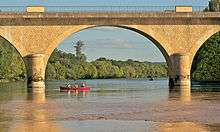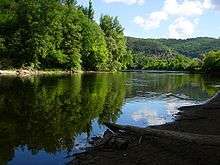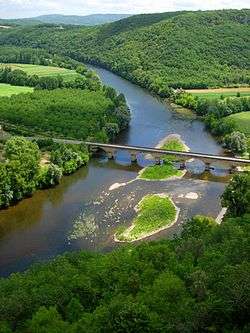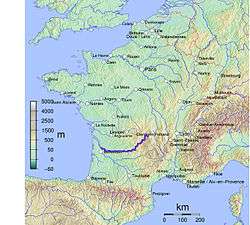Dordogne (river)
| Dordogne | |
|---|---|
|
The Dordogne in Périgord, near Castelnaud-la-Chapelle | |
|
Location of the Dordogne in France | |
| Native name | La Dordogne |
| Country | France |
| Basin | |
| Main source |
Massif Central 1,720 m (5,640 ft) |
| River mouth |
Gironde estuary 45°2′29″N 0°36′24″W / 45.04139°N 0.60667°WCoordinates: 45°2′29″N 0°36′24″W / 45.04139°N 0.60667°W |
| Basin size | 23,870 km2 (9,220 sq mi) |
| Physical characteristics | |
| Length | 483 km (300 mi) |
| Discharge |
|
The Dordogne (Occitan: Dordonha, French: La Dordogne) is a river in south-central and southwest France. The Dordogne and its watershed was designated Biosphere Reserve by the UNESCO on July 11 2012.[1]
Name
Contrary to appearances, the name of the Dordogne is not a recent word[2] resulting from the names of the Dore and the Dogne. It comes from an ancient Durānius,[3] derived from a Pre-Celtic root dur-, dor- (as the Durance).
The medieval forms adopted a redoubled suffix -ononia:[4] Dorononia fluvius[5] (sixth century), Dornonia (eighth century) that evolves in Dordonia (ninth century) by a phenomenon of dissimilation, giving the impression of an etymology *Dore-Dogne.
Geography
The river rises on the flanks of Puy de Sancy at 1,885 metres (6,184 ft) above sea level in the mountains of Auvergne, from the confluence of two small torrents above the town of Mont-Dore: the Dore[6] and the Dogne. It flows generally west about 500 kilometres (310 mi) through the Limousin and Périgord regions before flowing into the Gironde, its common estuary with the Garonne, at the Bec d'Ambès ("Ambès beak"), in the north of the city of Bordeaux.
Nature

The Dordogne is one of the few rivers in the world that exhibit the phenomenon known as a tidal bore.[7]
The upper valley of the Dordogne is a series of deep gorges. The cliffs, steep banks, fast flowing water and high bridges attract both walkers and drivers. In several places the river is dammed to form long, deep lakes. Camp sites and holiday homes have proliferated wherever the valley floor is wide enough to accommodate them
Below Argentat and around Beaulieu-sur-Dordogne, the valley widens to accommodate fertile farmland, well-watered pasture and orchards. In the towns, which are major tourist attractions because of their history and architecture, the quaysides are lined with eating and drinking places. In Périgord, the valley widens further to encompass one of France's main gastronomic regions, with vineyards, poultry farms and truffle-rich woodlands.
The main season for tourism in the Valley of the Dordogne is from June to September, with July and August being high season. The lifestyle and culture of the Dordogne valley attract both visitors and incomers from all over France, but also from many other countries, particularly Britain and Germany.
Course
The départements of France through which the Dordogne runs, together with some towns in those départements that are on or quite near the river, are as follows:
- The département of Puy-de-Dôme - The towns of Mont-Dore (near the source of the river), La Bourboule;
- The département of Corrèze - The towns of Argentat, Bort-les-Orgues, and Beaulieu-sur-Dordogne;
- The département of Lot - The towns of Souillac, Pinsac, Lacave, Meyronne, Creysse, Montvalent, Gluges, Floirac, Carennac Gintrac, Tauriac and Prudhomat;
- The département of Dordogne - The towns of Beynac-et-Cazenac, Sarlat, Saint-Cyprien, and Bergerac;
- The département of Gironde - The towns of Sainte-Foy-la-Grande and Libourne.
Tributaries


Main tributaries from source to mouth:
- (R) Chavanon;
- (L) Rhue;
- (R) Diège;
- (L) Sumène;
- (R) Triouzoune;
- (L) Auze;
- (R) Luzège;
- (R) Doustre;
- (L) Maronne;
- (L) Cère;
- (R) Sourdoire;
- (L) Ouysse;
- (L) Céou;
- (R) Vézère along which many of the great prehistoric caves of Southwest France are located;
- (R) Isle;
- (L) Laurence.
N.B. : (R) = right tributary; (L) = left tributary
Activities
Aside from the usual activities such as tennis and golf available in many areas of France, there are a number of water-related activities related to the Dordogne, including:
- Fishing, an age-old pastime for the locals and for visitors;
- Canoeing and kayaking, very popular (canoes & kayaks are easy to rent);
- Boating in a Gabare (a traditional skiff peculiar to the Dordogne);
- Rafting;
- Swimming;
- Motorboating;
- Sailing;
- Rowing and sculling;
- Waterskiing.
References
- ↑ "UNESCO description of the Bassin de la Dordogne".
- ↑ as the Midouze, a portmanteau that fuses the names of its two precursors, the Midou and the Douze.
- ↑ Sidonius Apollinaris
- ↑ influenced by the suffix -onna, frequent in river names, in France.
- ↑ Gregory of Tours
- ↑ Not to be confused with the Dore.
- ↑ Tidal bores, Mascaret, Pororoca (1). Myths, Fables and Reality !!!
External links
| Wikimedia Commons has media related to Dordogne River. |
- The Dordogne at the Sandre database
- The Dordogne Valley in the Lot department (website in French)
- The Dordogne Valley UNESCO Biosphere Reserve (website in French)

